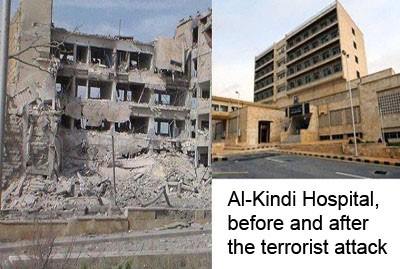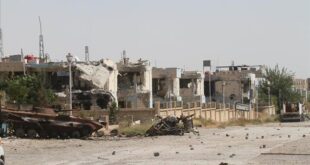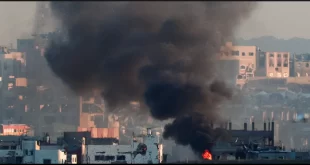Jan 3, 2014, Global Research
Since 2011 NATO-backed armed groups have systematically attacked more than two thirds of Syria’s public hospitals, and have murdered, kidnapped or injured more than 300 health workers.
The most recent example of this was the destruction of Aleppo’s specialist Al-Kindi hospital.
Syria’s Health Minister Dr Sa’ad al Nayef told a visiting Australian solidarity delegation on 22 December that foreign backed terrorists had detonated two truck bombs, completely destroying the hospital. All health workers inside were killed in the blast. Dr Malek Ali, Syria’s Minister for Higher Education told Syria’s SANA news agency that Al-Kindi, was a functioning educational hospital co-managed by his ministry.
In an Orwellian revision of events the BBC (21 December) reported the destruction of Al-Kindi with the headline: “Syria rebels take back strategic hospital in Aleppo”. The introduction claimed the “massive suicide lorry bomb” had managed “to seize back a strategic ruined hospital occupied by Assad loyalists.” Al-Kindi was said to have been “a disused building” and “according to an unconfirmed report, 35 rebels died in the attack”.
The BBC double-speak needs a little translation. These “rebels” were the mostly non-Syrian troops of the al Qaeda affiliated Jabhat al Nusra, funded and armed by Saudi Arabia and allowed free entry into northern Syria by the government of Turkey. The “Assad loyalists” were the staff of a large public hospital.
Dr al Nayef told the Australian delegation that, since the crisis began in March 2011, 67 of the country’s 94 national hospitals had been attacked and damaged, with 41 out of service. 174 health workers had been killed, 127 wounded and 33 kidnapped.
In addition, 1921 primary health centres had been damaged, and 678 were out of service. 421 ambulances had been lost or were out of service, and 197 support vehicles had been damaged, with 169 out of service.
The scale of destruction of health facilities, combined with attacks on schools, universities and massacres of civilians (often falsely blamed on the government), shows the NATO-backed armed groups have been intent on destroying a functioning state, and have no interest in trying to win public support.
Attacks on public hospitals have been carried out by both the Muslim Brotherhood-linked FSA and the Saudi backed groups al Nusra, ISIS and the Islamic Front.
Minister al Nayef showed the delegation video of the FSA (Farouk Brigade) attacking Homs National Hospital on 6 April 2012, another of the damage to Al- Salamiyeh National Hospital (Hama) after an attack on 21 January 2013 and a third video of the damage to Al Zahrway Hospital (Damascus) after yet another terrorist attack on 5 May 2013.
The Health Minister also gave the delegation details of the 26 November 2013 terrorist attack on Deir-Ateya Hospital in Rural Damascus, where 11 medical staff (2 Anesthesiologists, 3 Resident doctors, 4 Nurses and 2 Drivers) were stabbed to death.
Health services have been free in Syria and the Health Ministry says that “despite all the pressures and the economic siege” the ministry continues to provide free medical and health services, with “nearly 4.5 million citizens” visiting public hospitals in the last year and “more than 30 million” free consultations, treatments and other health services.
 Syria Support Movement solidarity with the Syrian people
Syria Support Movement solidarity with the Syrian people





